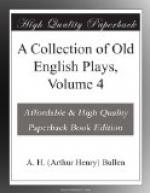Godf. Oh thou that dost demand of mee
Som fyre, som meate and harbor,
I see thou lately hast ben washt,
Hath Neptune ben thy barbor?
Sarl. This fellowe mearely flowtes our misery, And laughs att our distresses.
Mild. But, kind frende, Concerninge these yonge women, are they fayre?
Godf. Fayre flesh and cleane they bothe appeare And not lyke gypsies umber’d.
Mild. How many?
Godf. Just as thou and I when wee are Once but number’d.
Mild. Oh, Sarleboys, there’s comfort in these woords; They have allredy warmed my hart within, Why may not these bee they?
Sarl. Bee they or not, I had rather see one caudell downe my throate, To wash downe this salt-water, than bee mayster Of all the wenshes lyveinge.
Mild. Oh where, where, Where might I see too such?
Godf. Thou that goest sydewayes lyke a
crabb, gapst on mee
lyke an oyster,
Followe thy flat nose and smell them there, in th’out
part of
this cloyster.
Mild. Oh maye this peece of earthe proove happy to mee As hath the sea bin fatall.
Sarl. I’l followe and coold wish Boath cloyster and whole villadge weare a fyre Only to dry my clothes by.
Godf. Marry hange you You that so late scaped drowning for I take you For too pestiferous rascalls.
Exeunt.
Explicit Actus 2.
Act 3.
SCENE 1.
Enter the Lady de Averne
with a letter in her hand
readinge, and with her mayde.
Lady. And howe came you by this?
Mayde. Followinge you to th’chappell
And I protest not thinking anythinge,
Fryar Jhon o’th suddeine pluckt mee by
the sleeve
And whisperd in myne eare to give that to you,
But privatly, bycause it was a thinge
Only toweard your person.
Lady. Twas well doonne; But prithee do no more so, for this tyme Tak’t for a warninge.
Mayde. Madam I am skool’d.
Lady. Doo so, or ever loose me. Heeres[100]
sweet stuffe!
Can this be in a vowed monastick lyfe
Or to be fownd in churchmen? ’tis a question
Whether to smyle or vex, to laughe or storme,
Bycause in this I finde the cause of boathe.
What might this sawcy fellowe spy in mee
To incorradge such a boldnes? yes this letter
Instructs mee what: he seythe my affability
And modest smiles, still gracinge his salutes,
Moovd him to wryte. Oh what a chary care then
Had womene neede have boathe of lipps and eyes
When every fayre woord’s censur’d liberty,
And every kind looke meere licensiousnes!
I have bin hitherto so greate a stranger
To these unus’d temptations that in truthe
I knowe not howe to take this. Sylly fryar!
Madnes or folly, one of these’t must bee.
If th’one I pity, at the other laughe,
And so no more reguard it.




